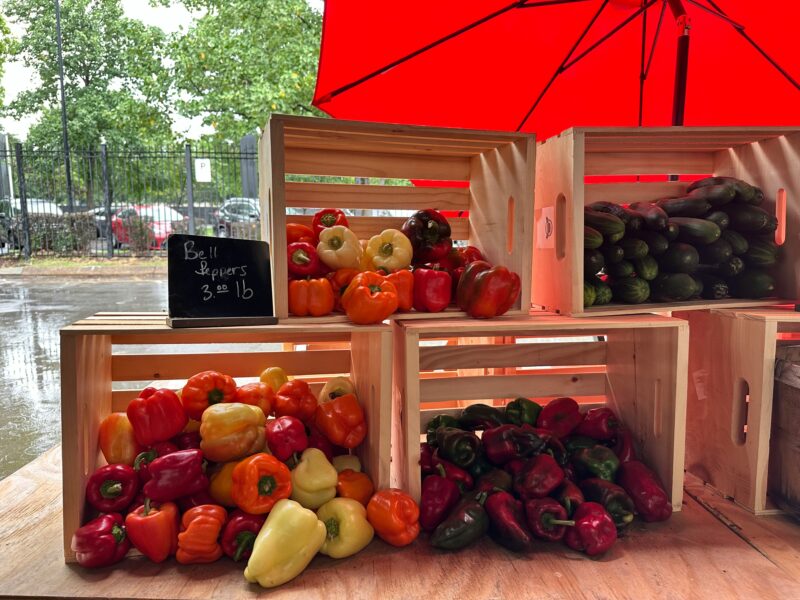As we celebrate Earth Month, it’s an opportune time to reflect on the impact of our choices on the health of our planet. One powerful way we can contribute to a sustainable future is by supporting organic agriculture. Organic farming practices prioritize environmental stewardship, biodiversity conservation, and soil health, making it a crucial ally in the fight against climate change.
Here are five choices you can make to support organic agriculture and help mitigate climate change:
- Choose organic foods for everyone in your family: You might be wondering if organic is worth the investment. The short answer is, yes. If the importance of organic is new to your lifestyle choices, we recommend reviewing the top 15 reasons to choose certified organic. By opting for organic produce and products, you’re supporting farming methods that skip synthetic pesticides and fertilizers, which can contribute to water pollution and soil degradation. Organic farming also promotes biodiversity by avoiding the use of genetically modified organisms and preserving natural habitats for wildlife.
Put simply, when you choose certified organic, you’re skipping over 700 chemicals used in conventional food and food production. This means that those 700 chemicals will not end up further contaminating the environment or your body. What we eat is important but what we feed our children is even more crucial because the evidence is clear that children are particularly vulnerable to the harmful effects of pesticides and other chemicals found in conventional food.
Several factors set children apart making them more susceptible to detrimental outcomes when exposed to the chemical cocktail found in our food supply and environment. When pesticides are used in food production, they don’t simply go away. No, you cannot just wash them off. These toxic persistent pesticides end up getting into our bodies, polluting our waterways, air, soil, and food and harm beneficial insects.
If you’re new to organic, it is not too late to switch and experience the health and environmental benefits that come with choosing organic. A study, from Friends of the Earth, showed that switching to an organic diet decreased levels of cancer-causing glyphosate – the main ingredient in Bayer-Monsanto’s pesticide Roundup – by 70 percent in participants’ bodies in just one week.
An important reason to buy your organic products locally is to lower the fossil fuel costs involved in transporting it. Most produce travels about 1,500 miles from farm to plate, and this long-distance, large-scale transportation of food consumes large quantities of fossil fuels – about 10 times the amount of energy derived from fossil fuels as the energy we get from the food itself, according to Cuesa. So, let’s support local organic agriculture that protects our food supply, pollinator health, and our waterways. Not sure where to start? Learn more in our blog, How To Support Local Organic Agriculture.
- Support organic dairy and meat: When it comes to protein, choose organic, You can go even further and choose organic options that are grass-fed, and free-range, which provides additional benefits. Organic proteins not only provide essential nutrients but also contribute to animal welfare and sustainable farming.
Two studies published in the British Journal of Nutrition show that organic milk and meat contain about 50% higher levels of beneficial omega-3 fatty acids than conventionally produced products. They also show that organic meat had lower concentrations of two saturated fats, and that organic milk and dairy products contain 40% more of the heart-healthy conjugated linoleic acid than their conventional counterparts.
Organic livestock farming practices prioritize animal welfare, pasture-based systems, and the avoidance of antibiotics and synthetic hormones. By choosing organic dairy and meat products, you’re supporting more sustainable agricultural practices that reduce greenhouse gas emissions and promote healthier ecosystems.
- Invest in organic cotton: According to studies, conventional cotton farming is notorious for its heavy use of pesticides and water, contributing to soil degradation and water pollution. It makes sense that what we put inour bodies matters. What we choose to put against it matters just as much, or more. Our skin is our largest organ and primary organ for absorption.
Those who value organic food may believe organic cotton is non-essential. Because cotton isn’t considered a food item, controls of pesticides and herbicides in conventional farming is more pervasive. Conventional cotton production is quite toxic and is considered the world’s dirtiest crop due to its heavy use of pesticides.
It is a little known fact that the by-products of cotton production used in our clothing, personal care, bedding, and furniture often go right back into our food supply. As much as 65% of total cotton production can end up on our plate. It can come directly through cottonseed oil, or indirectly through the milk and meats of the animals fed on cottonseed meal and cotton byproducts.
Organic cotton farming, on the other hand, utilizes natural methods like crop rotation and composting to maintain soil fertility and minimize environmental impact. Choosing organic cotton products helps reduce the carbon footprint of your wardrobe. Learn more about eco-fashion here and use our organic textile guide to locate organic products.
- Grow your own organic garden: Whether you have a backyard plot or a few pots on your balcony, growing your organic fruits and vegetables is a rewarding way to support sustainable agriculture and reduce your carbon footprint. Organic gardening practices, such as composting and companion planting, promote healthy soil and biodiversity while minimizing the need for synthetic inputs.
Here at Only Organic we often highlight gardening hacks and seasonal opportunities to grow your own food. Here are a few blogs we recommend:
- 7 Steps to Starting and Enjoying an Organic Garden
- Five Nutrient-Rich Veggies You Can Grow in Cold Weather
- How To Grow Organic Greens Indoors
- Advocate for organic policies: Get involved in supporting policies and initiatives that promote organic agriculture at the local, national, and international levels. By advocating for subsidies for organic farmers, stronger regulations on pesticide use, and incentives for organic food production, you can help create a more favorable environment for sustainable farming practices.
In addition to advocating for policy change, did you know that every time you make a purchase, you’re not just buying a product—you’re also voting for the kind of world you want to live in? It’s true! From the groceries you pick up at the store to the clothes you wear, each choice you make has an impact. By opting for organic products, consumers are not only prioritizing their health and safety but also voting for a cleaner planet, climate change mitigation, fair wages for farmers and farmworkers, and less pollution in our environment. So, every time you choose organic, you’re not just making a purchase—you’re casting a vote for a healthy food future. Learn more in this blog.
This Earth Month, let’s commit to making choices that support organic agriculture and contribute to a healthier planet for future generations. Together, we can cultivate a more sustainable and resilient food system, one choice at a time.









